ภาคอุตสาหกรรมกำลังตื่นตัวในการขับเคลื่อนธุรกิจสู่การเป็นองค์กร “คาร์บอนต่ำ” เพื่อร่วมมือกับประชาคมโลกในการปรับสมดุลธรรมชาติ โดยเฉพาะการเปลี่ยนแปลงสภาพภูมิอากาศและภาวะโลกร้อน จากการบริโภคพลังงานและการใช้ทรัพยากรธรรมชาติไม่คุ้มค่า ตลอดจนการขาดการบริหารจัดการทรัพยากรอย่างมีประสิทธิภาพ ส่งผลให้อุณหภูมิของโลกสูงขึ้นอย่างต่อเนื่อง
การปล่อยก๊าซคาร์บอนไดออกไซด์สู่บรรยากาศเป็นเรื่องที่ไม่สามารถหลีกเลี่ยงได้ตราบเท่าที่โลกยังมีการผลิตสินค้าและอาหาร ตลอดจนการบริการและการขนส่ง เพื่อรองรับความต้องการของผู้บริโภคทั่วโลก แนวทางปฏิบัติเพื่อบรรเทาผลกระทบจากสภาวะโลกร้อนที่เดินหน้าได้อย่างเป็นรูปธรรม คือ การควบคุมการขยายตัวการปล่อยก๊าซคาร์บอนไดออกไซด์ไม่ให้เพิ่มขึ้น ด้วยการพัฒนาเครื่องจักรที่ทันสมัยเหมาะสมกับการผลิต ติดตั้งเทคโนโลยีเพื่อช่วยลดการปล่อยก๊าซจากการผลิต ตามแนวทางการผลิตอย่างยั่งยืน ควบคู่กับการบริหารจัดการที่ไม่ก่อให้เกิดการสูญเปล่าและลดการสูญเสีย
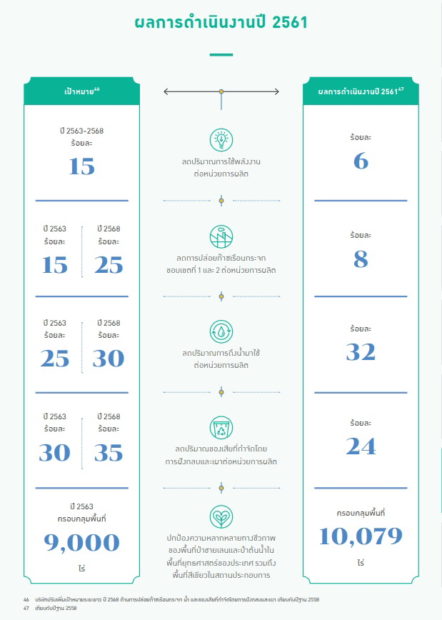
บริษัท เจริญโภคภัณฑ์อาหาร จำกัด (มหาชน) หรือ ซีพีเอฟ มุ่งมั่นขับเคลื่อนธุรกิจภายใต้ทิศทางความรับผิดชอบต่อสังคม 3 เสาหลัก คือ “อาหารมั่นคง สังคมพึ่งตน ดินน้ำป่าคงอยู่” ซึ่งการบริหารจัดการการผลิตเพื่อบรรเทาผลกระทบต่อสิ่งแวดล้อมเป็นเป้าหมายด้านดินน้ำป่าคงอยู่และสอดคล้องกันตามเป้าหมายการพัฒนาที่ยั่งยืนขององค์การสหประชาชาติ (Sustainable Development Goals: SDGs) ในการปกป้อง ฟื้นฟู และส่งเสริมการใช้ประโยชน์จากระบบนิเวศอย่างยั่งยืน โดยมีการบริหารจัดการทรัพยากรตลอดห่วงโซ่การผลิตให้เกิดประโยชน์สูงสุดและคุ้มค่าที่สุดตามแนวทาง eco-efficiency ซึ่งเป็นการสร้างสมดุลระหว่างการเติบโตของธุรกิจควบคู่ไปกับความรับผิดชอบต่อทรัพยากรธรรมชาติและสิ่งแวดล้อม
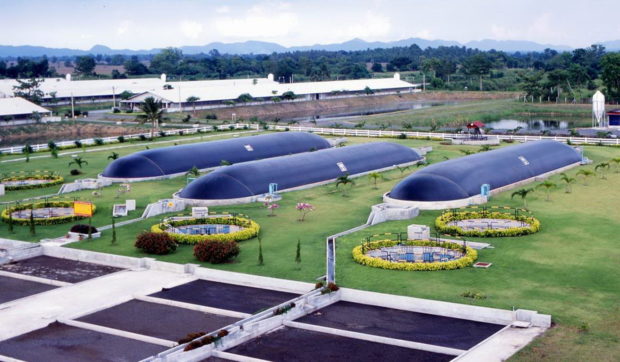
คุณวุฒิชัย สิทธิปรีดานันท์ รองกรรมการผู้จัดการอาวุโส ด้านความรับผิดชอบต่อสังคมและการพัฒนาอย่างยั่งยืน ซีพีเอฟ กล่าวว่า บริษัทฯ ได้กำหนดเป้าหมายปี 2568 ในการลดการปล่อยก๊าซเรือนกระจก 25% จากปีฐาน 2558 โดยให้ความสำคัญกับการลดการปล่อยก๊าซคาร์บอนไดออกไซด์ทั้งในกระบวนการผลิตและจากการใช้ผลิตภัณฑ์ของบริษัทฯ ผ่านโครงการต่างๆ โดยเฉพาะด้านพลังงาน เช่น โครงการผลิตไฟฟ้าจากก๊าซชีวภาพ โครงการใช้พลังงานจากชีวมวล โครงการโซลาร์รูฟทอปบนหลังคาโรงงาน 25 แห่ง โครงการนวัตกรรมอาหารสุกรรักษ์สิ่งแวดล้อม และการเปลี่ยนใช้บรรจุภัณฑ์ที่ผลิตจากวัตถุดิบจากธรรมชาติแทนพลาสติก คาดว่าจะช่วยลดการปล่อยก๊าซคาร์บอนไดอ๊อกไซด์ของทั้งองค์กรได้เฉลี่ยปีละ 522,000 ตัน
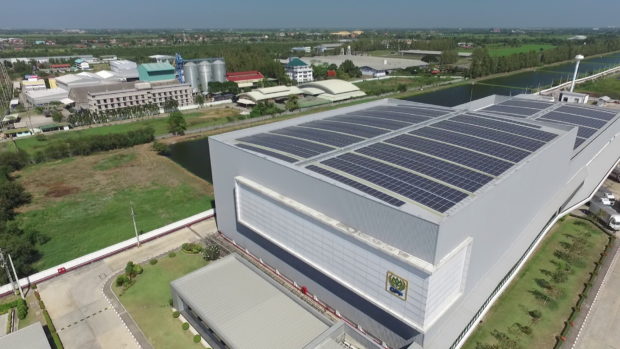
ซีพีเอฟยังมีโครงการผลิตภัณฑ์สีเขียว (green products) ซึ่งประกอบด้วยผลิตภัณฑ์ที่ได้รับฉลากคาร์บอนฟุตพรินต์และผลิตภัณฑ์ที่ได้รับฉลากลดโลกร้อน ได้แก่ ไก่สด ไก่มีชีวิต และลูกไก่ ซึ่งได้รับการรับรองจากองค์การบริหารจัดการก๊าซเรือนกระจก และกำลังดำเนินการในกลุ่มผลิตภัณฑ์อาหารสัตว์บก นอกจากนี้ ไก่สดและอกไก่นุ่มยังได้รับฉลากวอเตอร์ฟุตพรินต์ ตามมาตรฐาน ISO 14046 ส่งผลให้บริษัทฯ มีรายได้จากกลุ่มผลิตภัณฑ์สีเขียว (green revenue) ในปี 2561 มูลค่า 17,764 ล้านบาท คิดเป็น 10% ของรายได้จากกิจการในประเทศไทย
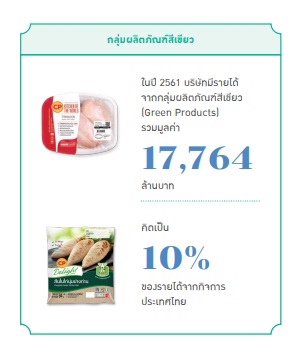
นอกจากนี้ ซีพีเอฟยังได้นำแนวทาง “neutral carbon” ไปใช้ในการจัดกิจกรรมความรับผิดชอบต่อความยั่งยืนในรูปแบบใหม่ภายใต้โครงการ เดิน-วิ่งการกุศล “Carbon Neutral Event” ด้วยการนำคาร์บอนเครดิตที่บริษัทฯ สะสมในโครงการลดก๊าซเรือนกระจกภาคสมัครใจตามมาตรฐานของประเทศไทย (Thailand Voluntary Emission Reduction Program: T-VER) จำนวน 560 ตันคาร์บอนไดอ๊อกไซด์เทียบเท่า มาชดเชยก๊าซเรือนกระจกที่ปล่อยออกมาจากการใช้พลังงานไฟฟ้าในการจัดงาน การเดินทางของผู้เข้าร่วมงาน การพักแรม อาหารและเครื่องดื่ม รวมทั้งสิ่งเหลือทิ้งจากการจัดงาน ให้เท่ากับศูนย์ โดยจะเริ่มดำเนินการในปี 2563
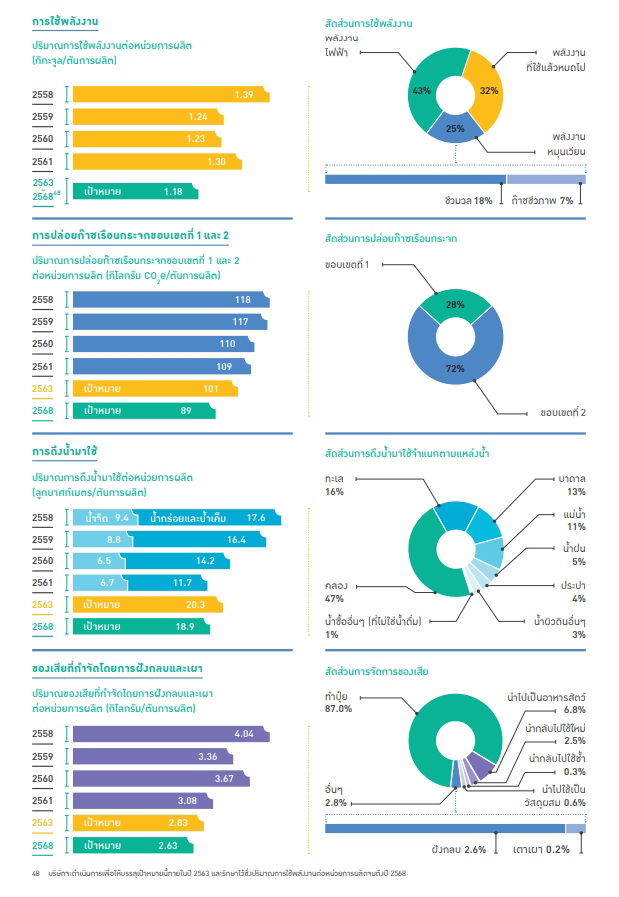
ภายใต้การเป็น “องค์กรคาร์บอนต่ำ” บริษัทฯ ยังกำหนดเป้าหมายลดปริมาณการดึงน้ำมาใช้ต่อหน่วยการผลิต 25% ภายในปี 2563 และ 30% ภายในปี 2568 ตามลำดับ พร้อมทั้งนำเทคโนโลยีทันสมัยเข้ามาสนับสนุนตลอดกระบวนการผลิต เพื่อลดปริมาณการใช้น้ำจากธรรมชาติและเพิ่มประสิทธิภาพการใช้น้ำให้คุ้มค่าที่สุด
ทั้งนี้ ผลิตภัณฑ์เนื้อไก่สดและผลิตภัณฑ์อกไก่นุ่มของบริษัทฯ ได้รับการรับรองฉลาก “ฟุตพรินต์การขาดแคลนน้ำ” (water scarcity footprint) เป็นรายแรกของประเทศไทยจากสภาอุตสาหกรรมแห่งประเทศไทย
คุณวุฒิชัยกล่าวว่า บริษัทฯ มีเป้าหมายในการจัดการน้ำอย่างยั่งยืน 3 แนวทางหลัก คือ 1. การประเมินความเสี่ยงการขาดแคลนน้ำเป็นประจำทุกปี ตามหลักการของ Aqueduct ซึ่งเป็นหน่วยงานประเมินความเสี่ยงสากลด้านน้ำ 2. การนำน้ำกลับมาใช้ใหม่ และ 3. การกระจายน้ำที่บำบัดแล้วจากฟาร์มปศุสัตว์และโรงงานแปรรูปอาหาร ให้กับชุมชนและเกษตรกรรอบโรงงานเพื่อบรรเทาผลกระทบจากการขาดแคลนน้ำ
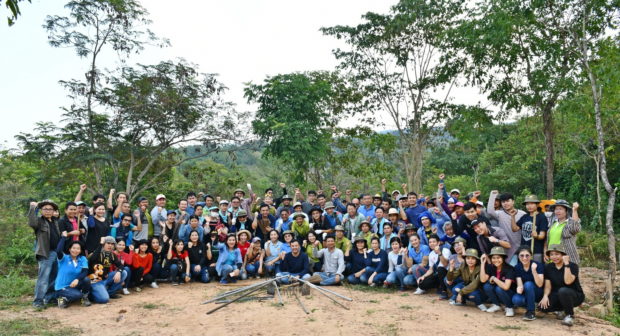
นอกจากนี้ ซีพีเอฟยังเดินหน้าโครงการอนุรักษ์ป่าบกและป่าชายเลน ผ่านโครงการ ซีพีเอฟ ปลูก ปัน ป้อง ป่าชายแลน ครอบคลุมพื้นที่ 2.388 ไร่ ใน 5 จังหวัด คือ สมุทรสาคร ระยอง ชุมพร พังงา และสงขลา และโครงการ ซีพีเอฟ รักษ์นิเวศ ลุ่มน้ำป่าสัก เขาพระยาเดินธง จังหวัดลพบุรี ครอบคลุมพื้นที่ 5,971 ไร่ เพื่อฟื้นฟูสภาพป่าให้กลับมาสมบูรณ์ ซึ่งเป็นอาหารของมนุษย์และสัตว์ และยังช่วยดูดซับและกักเก็บมลพิษที่เกิดจากการทำการเกษตร อุตสาหกรรม และครัวเรือน
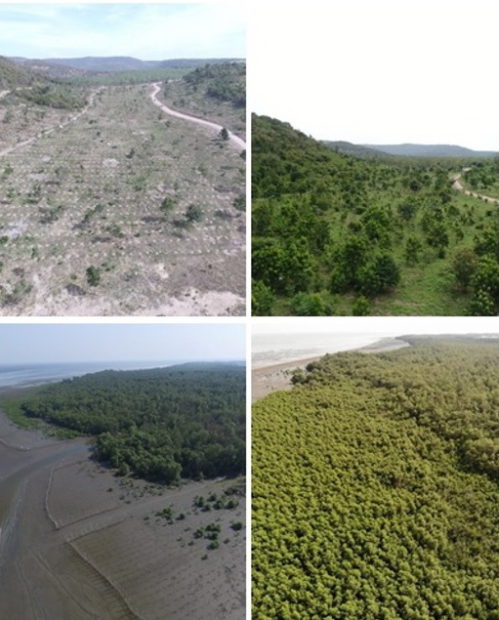
โครงการ ซีพีเอฟ รักษ์นิเวศ ลุ่มน้ำป่าสัก เขาพระยาเดินธง
จังหวัดลพบุรี ครอบคลุมพื้นที่ 5,971 ไร่
ซีพีเอฟยังคงมุ่งมั่นในการลดภาวะโลกร้อนอย่างต่อเนื่อง ด้วยการปรับปรุงและติดตั้งเทคโนโลยีที่สนับสนุนให้การใช้ทรัพยากรในกระบวนการผลิตเกิดประสิทธิภาพสูงสุด ลดมลภาวะและส่งผลกระทบต่อสิ่งแวดล้อมน้อยที่สุด เพื่อรักษาสมดุลธรรมชาติและอนุรักษ์สิ่งแวดล้อมให้คงอยู่อย่างยั่งยืน
…
CPF aims to become “low-carbon organization”, set to cut GHG emissions by 25% in 2025
Manufacturing industries are actively moving to become “low-carbon” organizations and adopt “low-carbon” production, as the global community strives to re-adjust natural balances amid climate change and global warming as a result of exploitation of energy and natural resources and inefficient resource management.
The emission of carbon dioxide to atmosphere is inevitable as long as global demand for products, food, services and transportation remains high. Concrete actions are capping CO2 emission through optimized resource and energy management, modernization of machinery, and installation of technology that helps reduce production-related gas emissions.
Charoen Pokphand Foods PLC (CPF) is dedicated to 3 pillars towards sustainable business operations: “Food Security, Self-Sufficient Society and “Balance of Nature”. Adjusting the production process to alleviate environmental impacts supports the pillars and UN Sustainable Development Goals (SDGs) which seek to protect, revitalize, and promote sustainable use of ecosystems as well as eco-efficiency way to mitigate climate change impacts.
Mr. Wuthichai Sithipreedanant, CPF’s senior vice president for corporate social responsibility and sustainable development, said that CPF sets the goal to reduce greenhouse gas emissions by 25% in 2025, from the level in the base year 2015. Under the goal to achieve sustainable business operations and business growth, CPF adopts changes from the base year in both production process and products. Such changes – including power generation from biogas, rooftop solar energy and innovative environmental-friendly swine feed – have reduced CO2 emissions by 522,000 tons on annual average.
Mr. Wuthichai added that CPF also develops green products including products with Thailand Greenhouse Gas Management Organization-certified carbon footprint labels like chicken meat, living chicken and chicks. Carbon footprint labels are being obtained for animal feed, expected to be granted in 2019. Meanwhile, fresh chicken meat and soft chicken breast are assigned water footprint labels under ISO 14046 standard. CPF generated Bt17,764 million from green products (so-called green revenue) in 2018, or 10% of total revenue contributed by the operations in Thailand.
CPF also adopts the “neutral carbon” approach in new socially-responsible sustainability activities, including “Carbon Neutral Event” which allows public participation in an activity that promises low GHG emissions. Under the event, CPF’s accumulated 560 tons CO2e carbon credit in Thailand Voluntary Emission Reduction Program (T-VER) will be used to neutralize the GHG emitted from the activity’s power usage, participants’ travel and camping, food and beverages, as well as any discarded items. The carbon neutral approach is expected to be implemented in 2020.
Under the low-carbon organization goal, CPF has set the goal to reduce water withdrawal per production units by 25% this year (2020) and 30% by 2525 respectively. Moreover, the company also implements modern technology throughout the supply chain to reduce the use of natural water and maximize water utilization.
CPF also received the “Water Scarcity Footprint” label for its raw chicken meat product and tender chicken breast product from the Federation of Thai Industries, as the first company in Thailand to be certified.
Mr. Wuthichai said that CPF has drawn three methods to manage water sustainability, including 1. Water risk-related management, which has been implemented every year under Aqueduct criteria. 2. Water Recycling which recycle treated water will be reused in livestock farms. 3. Treated water from farms and food processing plants will also be released to plant areas around the farms to ease water shortage.
The company has put in place the importance of protecting biodiversity through its initiative project named “CPF Grow – Share – Protect Mangrove Forestation Project” covered 2,388 rais in five coastal provinces including Rayong, Samutsakon, Chumporn, Phang-nga and Songkhla and “CPF Rak Ni-Ves, Pasak Watershed, Khao Phraya Doen Tong Project” in Lopburi covering 5,971 rais. The projects aimed to restore both coastal areas and forest as human and animal’s food sources. They will also help absorb and store pollutants that are emitted from agricultural, industrial and household activities.
CPF is dedicated to continually mitigating global warming impacts through the improvement and installation of technology that supports natural resource optimization in the production process and create minimum environmental impacts, to maintain natural balance and sustainably preserve the nature.

